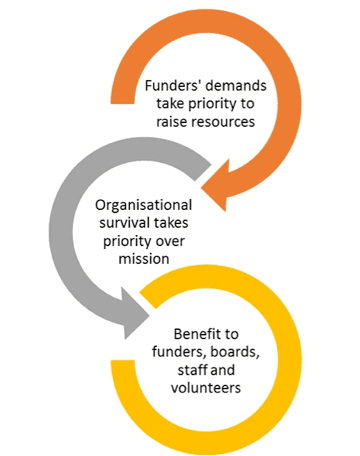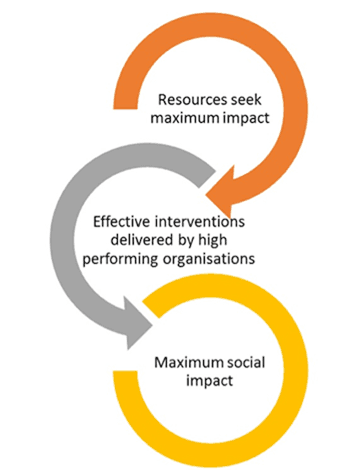I believe the social sector needs to undergo a paradigm shift if it’s to help tackle the big challenges society faces.
Even though there is a growing movement in the social sector toward more-effective, high-performing organizations, there is not yet a meaningful shift of funding toward effective strategies and interventions. Funders’ choices still drive the vast majority of funding rather than objective need-, impact-, or beneficiary-related criteria. We run seminars about collaboration, but it’s not the default way of working, either for those with the money or those raising it. The social sector, in other words, is less accountable to those it’s supposed to serve than it is to itself.
 A social sector accountable to itself.
A social sector accountable to itself.
This is a bleak characterization of a field that people undoubtedly enter into because they want to make a difference. I expected that my previous article would come under fire—in particular the idea of an “anti-social sector.” So far, it's been quite the reverse: People have reached out and thanked me for saying something they have sometimes thought. To be honest, I hoped I’d get shot down in flames.
If we acknowledge there is a problem, what can we do about it? We at New Philanthropy Capital (NPC) believe that it’s possible to reorient the social sector toward beneficiaries, and away from itself and its funders. But we can do this only through action at the sector level and in a collective way; we cannot achieve it through change to single organizations.
Are you enjoying this article? Read more like this, plus SSIR's full archive of content, when you subscribe.
Here are some of the most promising elements of such a structural revolution that we’ve identified—we’re keen to hear about others.
Shared measurement
Nonprofits’ impact measurement practices are oriented toward funders’ requirements rather than toward their own management, learning, and improvement—the research on this is quite clear. Furthermore, few nonprofits—fewer than 1 in 5—use standardized or common outcomes frameworks. So if one youth mental health project wants to learn from another about what’s working best, chances are it can’t—fewer than 1 in 25 are likely to have comparable results.
Funders and investors likewise can’t make rational decisions—they can’t focus on impact even if they want to, and our research says increasingly that they do. Fewer than 1 in 25 pairs of funding-investment options will be comparable.
The ability to learn from others is crucial to the ongoing development of any field, and shared measurement frameworks are required to maximize impact in funding decisions and in the effectiveness of interventions.
But standardization can also be dangerous. It’s possible that a government could dictate that an entire field uses a certain framework (for example, the Every Child Matters framework in the UK). But if that framework is developed without the involvement of frontline organizations, it likely won’t fit with practice; organizations will see it as a bureaucratic burden, and treat it as a compliance exercise rather than an opportunity to learn, share, and improve.
NPC has been working on shared measurement for some time—we’ve published frameworks themselves, including the JET (Journeys to Employment) Framework, and also emerging good practice on developing such frameworks. We’ve found that shared measurement works well only if frameworks are developed with the frontline organizations that are going to use them. So we build consensus with this group, develop core outcomes and measurement tools, and only then work with funders and investors to align with their needs.
Data labs
Even if organizations have common outcomes frameworks, it’s often a challenge to get hold of the outcomes data they need. For example, nonprofits working with ex-offenders need to know if they go on to offend in the future. That data is hard to collect—should they stay in contact with each participant? Should they build relationships with government—local and national—to keep track?
While open data is appealing, in most areas, there are huge challenges around data protection and security. Governments can’t publish individual-level data, but that’s what nonprofits need to track participants.
Perhaps what we need is an intermediary to sit between government data and the social sector—one that can match together nonprofits’ cohort data and government outcomes data in a way that’s safe, secure, and robust.
NPC played this role in working with the UK Ministry of Justice to develop the Justice Data Lab. Nonprofits provide the data lab with a list of participants. The data lab returns group outcomes data, at no cost to the nonprofit. And because the data lab has access to a huge data set, it can also provide a matched comparison of groups’ outcomes data—real outcomes data and a counterfactual, for free! Take a look at the latest release of findings—it’s pretty unusual in our field to see a list of programs compared so directly.
We’re incredibly excited about replicating this model. We’re talking to a number of other government departments in the UK about it and believe it can work in other countries as well.
Systemic scaling
Like others, NPC has explored scaling impact for some time. We started out looking for knowledge about how to scale. But we now believe that more of the problem sits with the lack of demand for scale from funders/investors and nonprofits/social enterprises. There is certainly a growing body of knowledge about how we can work toward scale when the demand is there.
We are developing a program of work that merges emerging best practice on scaling and the best of systems theory; only by fusing these two perspectives will the social sector scale solutions to the point where it can focus on the only metric that matters—the percent of addressable need that it does not address.
Systemic scaling involves focusing simultaneously on the organizations, practices, and technologies we want to scale, and on changes in the system they inhabit. It means bringing together coalitions from across the system, sharing a common goal (reducing unaddressed need), combining perspectives, and managing all the changes.
Impact leadership
Ultimately, shared measurement, data labs, and systemic scaling are just technical solutions. We can develop expertise in them and evangelize about them, but the status quo will remain undisturbed unless the leadership of the social sector, and society more broadly, starts to demand them.
 A social sector truly accountable for its results.
A social sector truly accountable for its results.
So we are developing strategies to nourish, encourage, and identify leaders who are putting their mission before their organization, their field before themselves, and the outcomes they need to deliver before the challenges of delivering them. In the United States, Mario Morino is at the heart of building just such a movement.
I believe that this impact leadership movement will grow as we experiment more with the field-level transformative strategies I have outlined above—more people will see that it’s possible to change the norm and will be inspired to get in on the action.
In the end, the test of whether we are ready for a paradigm shift will be whether we are prepared to live up to the oft-cited but rarely seen maxim of wanting to put ourselves out of business. Truly great impact leaders will empower the people they serve and ultimately disappear from view as those people achieve the change they deserve.
Support SSIR’s coverage of cross-sector solutions to global challenges.
Help us further the reach of innovative ideas. Donate today.
Read more stories by Tris Lumley.

